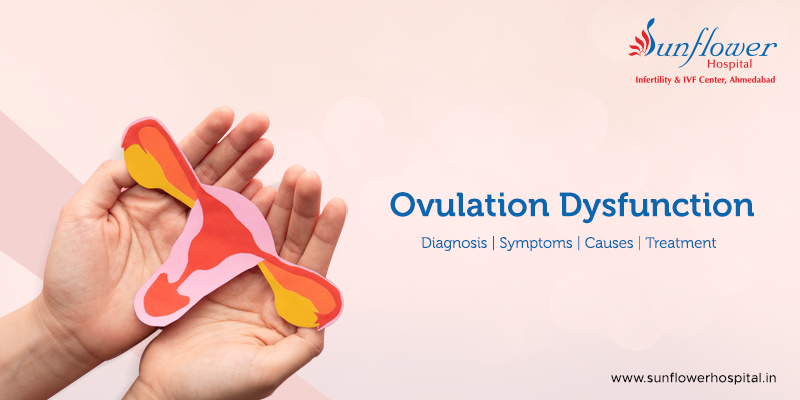Couples trying to conceive may be aware of the term fertility. For women, it refers to their ability to conceive, whereas for men, it refers to their ability to produce healthy sperm. Fertility in both cases depends on several factors, including lifestyle and medical conditions.
In this blog, we will discuss one such factor affecting a female’s ability to conceive, i.e., ovulation dysfunction. Let’s begin!
What is Ovulation Dysfunction?
Before understanding ovulation dysfunction, let us understand ovulation briefly.
Ovulation is a natural process wherein one of the female ovaries releases egg/eggs, which then meet the sperm for fertilization. When the released egg is not fertilized, the uterus sheds a lining, referred to as menstruation/menstrual bleeding. Hence, a woman can technically not have her regular menstrual cycle without ovulating.
So, ovulation dysfunction refers to a medical condition wherein women menstruate for nine or less than nine times per year. It is also the case of irregular and abnormal menstrual cycle or complete absence of ovulation.
How to Diagnose Ovulation Dysfunction?
Our infertility doctors will recommend certain tests to analyze the hormone levels and confirm the condition. Some of them are:
- AMH (Anti-Mullerian Hormone)
It is a blood test to measure the amount of anti-mullerian hormone released by the ovary. Low AMH levels can indicate reduced fertility and poor ovarian function.
- FSH Blood Level
This blood test is undertaken to check the presence of FSH (Follicle Stimulating Hormone) in the blood and determine whether the patient is nearing menopause.
- Ultrasound
High-frequency sound waves are used in a scan to check the functioning of ovaries and the development of follicles. Small ovaries and small follicles might indicate menopause.
- Progesterone Blood Level
To check whether you have ovulated, the doctors will suggest a blood test that indicates your progesterone level.
Symptoms of Ovulation Dysfunction
Females suffering from ovulatory dysfunction might have irregular or absent menstrual cycles, low abdominal bloating, infertility, fatigue, mood swings, or a headache.
Causes of Ovulation Dysfunction
- Decrease in Ovarian Reserve
A woman is born with a certain amount of eggs, the quantity and quality of which decreases as she ages. It can be because of multiple known and unknown factors, but the decline most commonly begins in the late 30s or 40s.
- Luteal Phase Defect
The luteal phase refers to the time gap between the women’s ovulation and day 1 of the menstrual cycle. 10 to 16 days are the ideal gap, but with the deficiency of the luteal phase, their body might not be able to produce the appropriate amount of progesterone. Additionally, the uterine lining might not be capable of sustaining a conception.
- Premature Ovarian Failure
A woman’s ovaries play an essential role in the process of conceiving. Premature ovarian failure occurs when the ovaries stop functioning under 40. One thing to note in such cases is that no specific root cause is identified to explain the condition.
- Polycystic Ovarian Syndrome (PCOS)
This condition refers to hormonal imbalance, which interferes with the routine menstrual cycle. As a result, it leads to several issues concerning ovulation. It is often diagnosed with symptoms like excess hair growth, irregular periods, and difficulty losing weight.
- Stress
Mental or physical stress from eating disorders, extreme weight loss or gain, and excessive exercise can hinder the normal functioning of the pituitary gland producing FSH and LH hormones. It ultimately disturbs the process of ovulation and menstrual cycle.
- Hyperprolactinemia
The production of prolactin in excessive amounts can repress the natural hormonal balance, ultimately preventing the process of ovulation.
- Hypothyroidism
Under this condition, thyroid hormone production is decreased, which can prevent or slow down the ovulation process.
Treatment Options for Ovulation Dysfunction
- Medications
Doctors recommend birth control pills to regulate and stimulate the menstrual cycle when the woman is not looking forward to conceiving. Doctors might prescribe Letrozole (Femara) or Clomiphene Citrate (Clomid) for infertility patients suffering from PCOS. These drugs are given to induce ovulation by stimulating the ovaries.
If clomiphene citrate doesn’t prove to be effective alone, more fertility medications like HMG (Human Menopausal Gonadotropin), HCG (Human Chorionic Gonadotropin), and FSH (Follicle Stimulating Hormone). Lastly, progesterone might be essential to help the uterine lining mature and sustain conception.
Medications are given to control the excessive production of prolactin, and in the case of hypothalamic amenorrhea, FSH and LH are recommended to control the production of these hormones.
- In Vitro Fertilization (IVF)
IVF is one of the most commonly recommended fertility treatments for women who have infertility, especially ovulatory dysfunction. The hormonal medications given during the procedure help in regulating the reproductive cycle and ensure the release of multiple eggs, ultimately increasing the chances of fertilization.
To briefly explain the procedure, our best IVF doctor in India will retrieve eggs to leave in the laboratory for fertilization with the partner’s/donor’s sperm. Post fertilization, the embryos will be implemented in the uterus to encourage conception.
- Ovulation Induction (OI)
During this process, medical professionals recommend fertility medications to encourage the development of eggs and ovarian follicles. The process is either done using insemination or alone and is known to be effective for medical conditions concerning luteal phase defects and ovulatory dysfunction.
The doctors might prescribe progesterone and more fertility drugs to stimulate uterine lining development to support conception. To repress the luteal phase defects, you might be suggested FSH (Follicle Stimulating Hormone) and HCG (Human Chorionic Gonadotropin) that triggers ovulation.
- Lifestyle Changes
Several lifestyle factors affect fertility which is why patients are advised to change some of their habits. It might include exercising regularly, maintaining or reducing weight to ideal numbers, and using stress relieving techniques.
Wrapping Up
Ovulation disorders are one of the primary causes of infertility in females, and several factors affect the normal production and release of eggs in the female body. Since we provide the best infertility treatment in India, we treat most of these disorders using medications or implementing certain lifestyle changes that include food for ovulation stimulation.
A Sincere Advice: Women having trouble with their menstrual cycle should visit our fertility specialist for excellent assistance, diagnosis, and treatment, all of which are necessary for a successful conception.


Leave a Comment